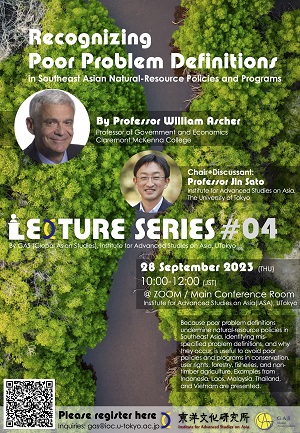We cordially invite you to the 4th GAS Lecture Series on September 28th (Thu), 2023. This event will be held both online and in-person. To join this event, please fill in the form below.
Title: Recognizing Poor Problem Definitions in Southeast Asian Natural-Resource Policies and Programs
Speaker: William Ascher, Professor, Claremont McKenna College
William Ascher, Yale University PhD, is the Donald C. McKenna Professor of Government and Economics at Claremont McKenna College, and directs the Environment, Economics, and Politics Program. He has consulted with the World Bank, the USEPA, and the Ford Foundation, and taught at Tokyo University, Dundee University, the Universidad de Chile, and Mexico’s CIDE. His Asian and Latin American research spans socio-economic and natural-resource policy; his methodology research covers political-economic forecasting, political psychology, and the policy sciences. His recent books are Development Strategies and Inter-Group Violence; The Evolution of Development Thinking; Understanding the Policymaking Process in Developing Countries; The Psychology of Poverty Alleviation; and Moving within Borders: Addressing the Potentials & Risks of Mass Migrations in Developing Countries (in press).
Chair・Discussant: Jin Sato, Professor, Institute for Advanced Studies on Asia, The University of Tokyo
Abstract:
Because poor problem definitions undermine natural-resource policies in Southeast Asia, identifying mis-specified problem definitions, and why they occur, is useful to avoid poor policies and programs in conservation, user rights, forestry, fisheries, and non-timber agriculture. Faulty problem definitions, such as defining narrow solutions as ultimate problems, or restricting consideration of impacts on stakeholders, restrict access to policymaking. Southeast Asian problem definitions calling for restrictive policies (such as complete bans on shifting cultivation or mangrove removal) lack the recognition of participatory and material deprivations on low-income people impacted by these restrictions. The reasons why poor problem definitions occur include ambiguous doctrines, bureaucratic interests, resource appropriation, prestige of inappropriate models, and goal substitution. Examples from Indonesia, Laos, Malaysia, Thailand, and Vietnam are presented.
Date and time: September 28 (Thu), 2023, 10:00AM-12:00PM (JST)
Format: Hybrid
Venue:
– On-site: Main Conference Room (303), Institute for Advanced Studies on Asia, The University of Tokyo
– Online via Zoom
Registration: https://u-tokyo-ac-jp.zoom.us/meeting/register/tZMkduirqzorE9L_qdy-mcK4RPqRQxRO8wW6
Language: English
Organizer: GAS Initiative
Contact: gas[at]ioc.u-tokyo.ac.jp

